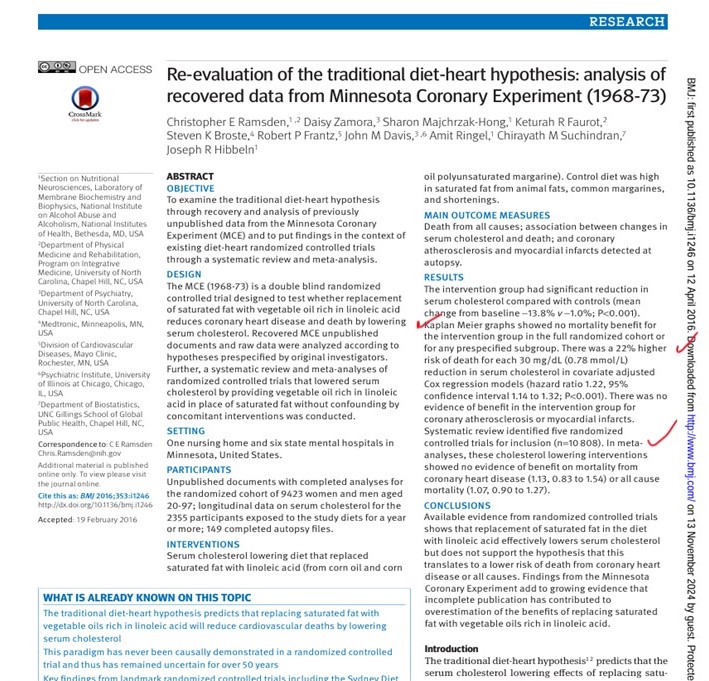"Uncover the truth behind the groundbreaking discovery of the causes of the world's biggest problems. 'The Root Causes' will change how you view the world!"
Welcome to Minnesota Coronary Experiment
"That cholesterol is the cause of heart attack."


We have been lied...
Added to another lie...They prescribe statin.
Statin drug manufacturers are driven by profit motives, not your well-being, fueling a $1 trillion industry..


(Hidden To The Public For Four Decades)
A Critical Re-evaluation of the Minnesota Coronary Experiment: Insights from Recovered Data (Hidden from the Public for 43 Yrs)
Explore our innovative studies on coronary health and laboratory advancements.
This abstract summarizes a study that critically examines the traditional diet-heart hypothesis, which suggests that replacing saturated fat with vegetable oils rich in linoleic acid reduces coronary heart disease (CHD) and death by lowering serum cholesterol. The study focuses on the Minnesota Coronary Experiment (MCE), a randomized controlled trial (RCT) conducted between 1968 and 1973 that was never published to the public. Notably, this study was deliberately hidden for more than 40 years and was only released in 2016 when the leading estate investigator discovered the unpublished data in the basement of Ancel Keys, the researcher who initially introduced the manipulated data of the lipid hypothesis.
Key findings from the study include:
MCE Data: The intervention group in the MCE, which replaced saturated fats with vegetable oil rich in linoleic acid, experienced a significant reduction in serum cholesterol compared to the control group. However, this reduction did not translate into improved survival. In fact, for every 30 mg/dL reduction in serum cholesterol, there was a 22% increased risk of death. Participants who had greater reductions in cholesterol had a higher risk of mortality.
Systematic Review & Meta-analysis: The authors performed a systematic review and meta-analysis of randomized controlled trials (RCTs) that lowered cholesterol by replacing saturated fat with linoleic acid (from vegetable oils). They found no evidence of a mortality benefit from these interventions, either for coronary heart disease or all-cause mortality.
Conclusion: The study concludes that while replacing saturated fat with linoleic acid effectively lowers serum cholesterol, it does not reduce the risk of death from coronary heart disease or all causes. These findings challenge the traditional diet-heart hypothesis and suggest that previous positive results from trials, including MCE, were potentially overestimated due to incomplete publication of data.
Key Points:
The MCE data was hidden for over 40 years before being released in 2016.
For every 30 mg/dL reduction in serum cholesterol, there is a 22% increased risk of mortality.
A meta-analysis of RCTs failed to show any mortality benefits from cholesterol-lowering interventions involving linoleic acid.
The traditional diet-heart hypothesis, suggesting that replacing saturated fats with linoleic acid reduces heart disease and mortality, is not supported by the available evidence.
This research adds to the growing body of evidence that questions the assumed benefits of replacing saturated fats with polyunsaturated vegetable oils.
By: Glenn Rosaroso Vale, BSMT, MS(IT), MBA
The Minnesota Coronary Experiment provided invaluable insights into heart health and nutrition. Highly recommend their research!
Glenn R. Vale


★★★★★
The Minnesota Coronary Experiment (MCE) is a beacon of scientific discovery, offering valuable insights into heart health and nutrition. Like a carefully composed symphony, it examined the relationship between fats and cardiovascular health, though its results were more complex than expected. Researchers replaced saturated fats with polyunsaturated fats, only to find mixed results, revealing that science often resists simple answers. The experiment's legacy, though occasionally clouded by controversy, remains vital, highlighting the need for thoughtful, long-term research. It serves as a guiding light, urging us to question and explore the intricate connections between diet and heart disease.
Joseph Magpuyo


★★★★★
Coronary Research Lab
Innovating solutions for heart health through advanced research and experimentation in Minnesota's leading laboratory.
Contact Us


For inquiries related to the Minnesota Coronary Experiment, please reach out to our team.
Health
Understanding illness to empower your well-being journey.
Wellness
Knowledge
info@rootcauseprevention.com
903-268-6664
© 2024. All rights reserved.
grfv@sbcgloal.net







